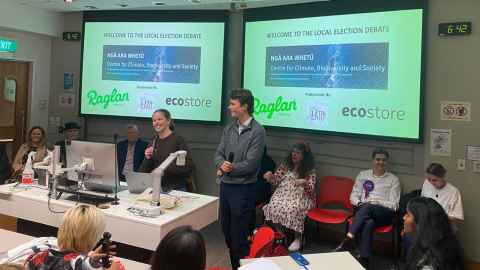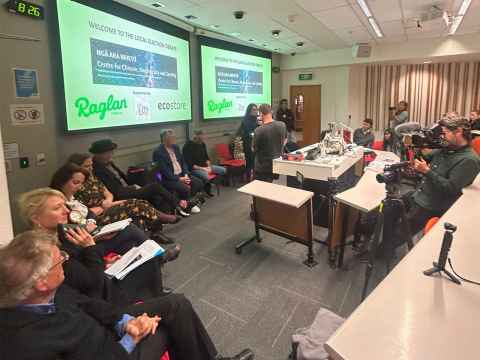Students put sustainability on the local election agenda
8 October 2025
With voting in the 2025 local elections now drawing to a close, sustainability has emerged as an important issue.

A lively on-campus panel that gave students the chance to quiz candidates ahead of the local body elections aimed to raise student awareness of local body politics.
The panel was jointly organised by the Sustainable Futures Collective, the Public Policy Club and the University of Auckland Debating Society, with support from Ngā Ara Whetū – Centre for Climate, Biodiversity & Society and the Sustainability Hub.
More than 80 people attended, most of them students, alongside community members, journalists and candidates standing for local boards and Auckland Council wards. Among the panellists were candidates standing for both ward and local board seats across central Auckland. They included Waitematā and Gulf ward contenders Lester Bryant, Mike Lee, Selena Yanpei-Lu Renner, Genevieve Sage and Patrick Reynolds, along with current councillors Julie Fairey (Albert-Eden-Puketāpapa) and Sarah Paterson-Hamlin (Whau).
Robert Hoskins, internal events officer for the Debating Society, said the aim was to boost student interest in local politics.
“We had two primary goals; encouraging student engagement with local politics by providing a space in which the community could come together and hear about the issues affecting Auckland, and secondly, to give students an opportunity to engage with candidates for councillor and local board seats in the areas where many of us live, work and study.”
Key topics raised during the debate included public transport and Auckland’s future growth, with strong discussion around housing, rates, and the pressures of a growing population.
Sustainability concerns featured prominently, from the need for climate-resilient planning and stormwater management to reducing transport emissions, the city’s largest source of greenhouse gases.
Candidates also debated how to encourage greater uptake of walking, cycling and public transport, and how to protect green spaces across the city.
Students had the final third of the debate to ask questions, which ranged from the candidates’ positions on Māori wards to the sale of Auckland airport shares.
Several candidates stressed the importance of making Auckland more liveable and resilient, while some acknowledged the need to restore trust in local politics to better engage younger voters.
Feedback from both candidates and attendees was positive.
“Many candidates expressed gratitude to have the opportunity to engage with students, and some attendees mentioned this was the first time they had learned about the role of councillors, as well as who the candidates in their ward actually were,” Hoskins said.
We are so pleased to support our emerging sustainability leaders in ensuring that these critical issues are brought to the forefront in our elections.

Public Policy Club event co-director Miyuni Karnasuriya says that, although candidates disagreed on many issues, one message they all echoed was the need for more student engagement in local politics.
“We hope that through platforming these diverse candidates we equipped students with the tools and information to make their vote count."
Organisers hope the debate will become a regular fixture around future elections.
“We are so pleased to support our emerging sustainability leaders in ensuring that these critical issues are brought to the forefront in our elections,” says Associate Professor Maria Armoudian, director of the Sustainability Hub and co-executive director of Ngā Ara Whetū.
“Our lives and livelihoods are wholly dependent on a healthy physical and social environment.
“These University of Auckland students understand this and have done a fantastic job in ensuring these matters are high on the political agenda.”
The last day to enrol to vote in the local elections is Friday, October 10, 2025.
Media enquiries
Email: mediateam@auckland.ac.nz